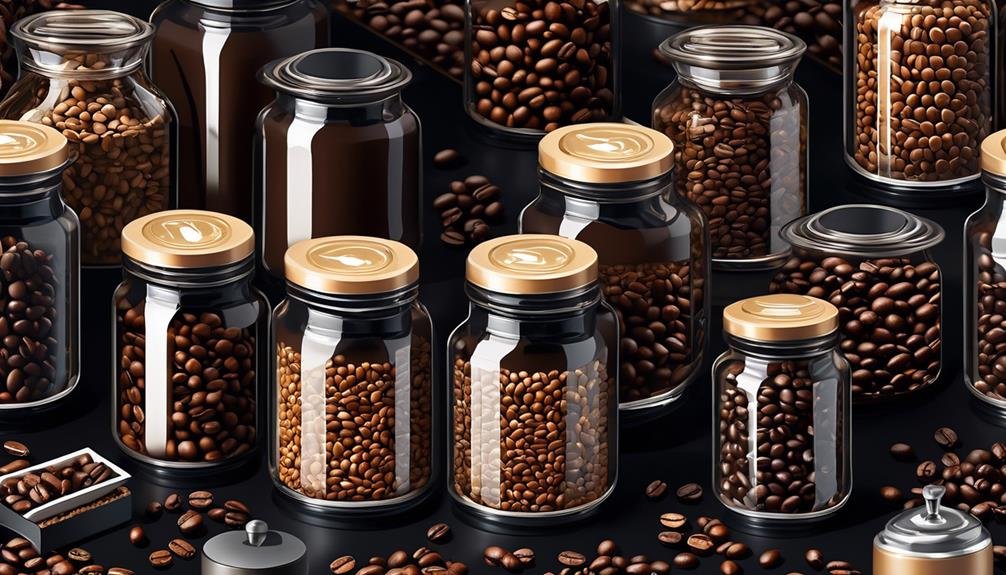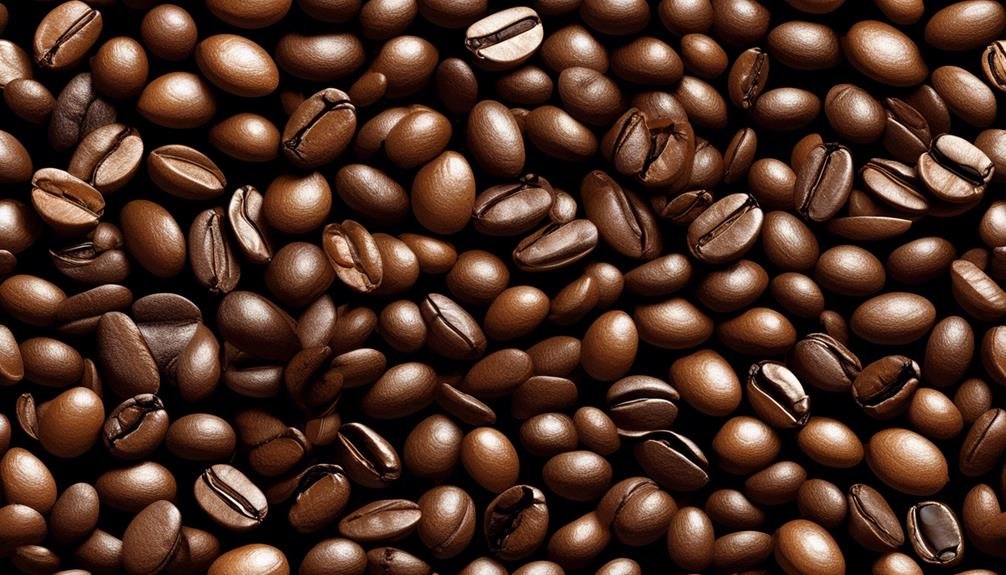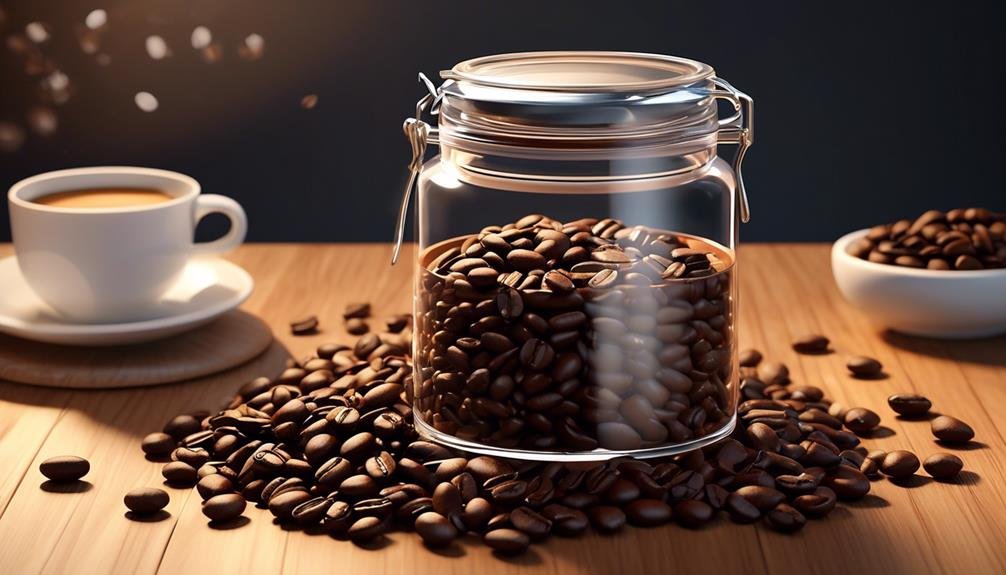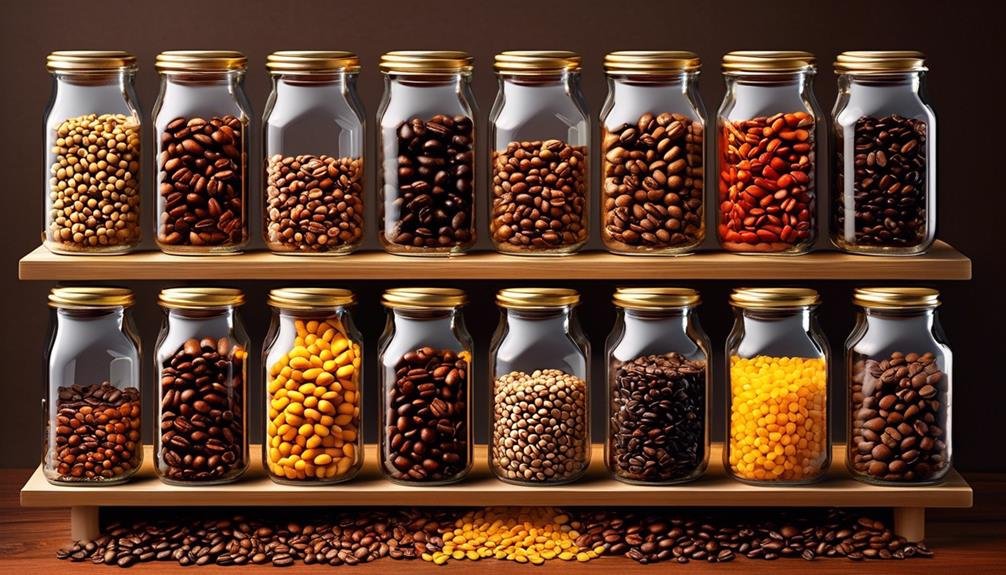So, you've got your hands on some top-notch coffee beans and you want to make sure they stay fresh and flavorful for as long as possible.
Well, my friend, the key lies in proper storage. You see, coffee beans are like delicate little time capsules, full of rich aromas and complex flavors just waiting to be unleashed. But if you don't handle them with care, all that goodness will slip away faster than you can say 'java.'
So, what is the best way to store coffee beans, you ask? Well, sit tight and let me spill the beans on this little secret.
Key Takeaways
- Storing coffee beans in an airtight container is crucial to prevent oxidation and maintain freshness, flavor, and quality.
- Choosing a non-reactive storage container made of materials like stainless steel or ceramic is ideal.
- Properly labeling containers with the roast date helps determine freshness and enjoy optimal flavors.
- Coffee beans should be stored in a cool, dark place with low humidity, away from light and heat, to preserve flavor and aroma.
Importance of Proper Coffee Bean Storage
Proper coffee bean storage is crucial for maintaining the freshness, flavor, and quality of your beans. When it comes to coffee, you want to ensure that every cup you brew delivers the rich and aromatic experience you desire. To achieve this, it's essential to understand the importance of storing your coffee beans correctly.
Oxygen, moisture, heat, and light are the four main enemies of coffee beans. Exposure to these elements can lead to oxidation, which causes the beans to lose their flavors and aromas. Therefore, it's vital to store your coffee beans in an airtight container, such as a sealed bag or airtight canister, to prevent oxygen from degrading their quality.
Moisture is another factor that can negatively impact your coffee beans. Moisture can cause the beans to become stale and develop mold. To avoid this, store your beans in a dry environment and ensure that the container you use is moisture-proof.
Heat and light can also accelerate the degradation process of coffee beans. It's advisable to store your beans in a cool, dark place, away from direct sunlight or heat sources like stoves or ovens. This will help preserve the flavors and aromas of your coffee beans for a longer period.
Choosing the Right Storage Container
To ensure the optimal freshness and quality of your coffee beans, selecting the right storage container is of utmost importance. The right container will protect your beans from moisture, air, light, and heat, which can all negatively impact their flavor and aroma.
Here are some key factors to consider when choosing a storage container for your coffee beans:
- Airtight seal: Look for a container that has a tight seal to prevent air from entering and oxidizing the beans. This will help preserve their freshness and flavor for a longer period of time.
- Material: Opt for a container made of a non-reactive material such as stainless steel or ceramic. Avoid plastic containers, as they can absorb odors and affect the taste of your coffee.
- Size: Choose a container that's just the right size for your coffee beans. It should have enough space to hold the beans without leaving too much empty room, which can lead to faster oxidation.
- UV protection: Find a container that offers UV protection to shield your beans from sunlight. UV rays can degrade the quality of your coffee beans over time.
- Easy to use and clean: Look for a container that's easy to open and close, allowing you to access your beans conveniently. Additionally, consider a container that's easy to clean to ensure the maintenance of hygiene.
Avoiding Common Storage Mistakes

One common mistake to avoid when storing coffee beans is neglecting to properly label the container with the roast date. Many coffee enthusiasts overlook this crucial step, but it can greatly affect the freshness and flavor of your coffee. Without a clear indication of when the beans were roasted, it becomes difficult to determine their freshness and know when they are past their prime. To help you understand the importance of labeling your coffee containers, here is a table showcasing the ideal shelf life of coffee beans based on their roast date:
| Roast Level | Shelf Life | Flavor Profile |
|---|---|---|
| Light Roast | 1-2 weeks | Bright and fruity |
| Medium Roast | 2-3 weeks | Balanced and smooth |
| Dark Roast | 3-4 weeks | Bold and rich |
As you can see, the flavor profile and shelf life of coffee beans vary depending on the roast level. By labeling your containers with the roast date, you can ensure that you consume your coffee beans at their peak freshness. This simple step will allow you to fully enjoy the rich and complex flavors of your favorite coffee. So, remember to always label your coffee containers and savor every sip of your perfectly stored coffee beans.
Best Environment for Coffee Bean Storage
To ensure optimal freshness and flavor in your coffee beans, it's essential to understand the ideal storage environment. Proper storage can make a significant difference in preserving the quality of your coffee beans for an extended period. Here are five key factors to consider when creating the best environment for coffee bean storage:
- Temperature: Store your coffee beans in a cool, dry place away from direct sunlight and heat sources. Aim for a temperature between 50-70°F (10-21°C) to prevent the beans from deteriorating.
- Humidity: Coffee beans are hygroscopic, meaning they absorb moisture from the air. To maintain their freshness, store them in an airtight container in a low humidity environment, ideally below 60% humidity.
- Light: Exposure to light can accelerate the degradation of coffee beans. Keep your beans in a dark place or in a container that blocks out light to preserve their flavor and aroma.
- Oxygen: Oxygen is the enemy of coffee beans as it causes oxidation and stales the flavor. Use airtight containers with one-way valves to release carbon dioxide while preventing oxygen from entering.
- Time: Coffee beans are at their peak flavor within two weeks of roasting. To enjoy the best quality, purchase freshly roasted beans in small quantities and consume them within a month.
Following these guidelines will help you create an optimal storage environment for your coffee beans, ensuring that each cup you brew delivers the freshest and most flavorful experience possible.
Length of Coffee Bean Storage

The optimal length of coffee bean storage depends on several factors, including the roast level and type of coffee bean you have. As a knowledgeable coffee enthusiast, you understand that coffee beans are at their peak freshness within the first two weeks after roasting. During this time, they release carbon dioxide, known as degassing, which is essential for a flavorful cup of coffee. However, if you prefer a milder taste with less acidity, you can extend the storage time up to four weeks.
It's important to note that the storage conditions play a crucial role in preserving the coffee's quality. To maintain freshness, store your coffee beans in an airtight container away from light, heat, and moisture. Oxygen, light, and humidity can accelerate the deterioration process, resulting in a stale and lackluster brew.
While it may be tempting to buy coffee beans in bulk to save money, it's worth considering the trade-off between cost and freshness. Coffee beans start losing their flavor and aroma as soon as they're exposed to air, so it's advisable to purchase smaller quantities more frequently to ensure optimal freshness.
How to Store Different Types of Coffee Beans
To ensure optimal freshness and flavor, it's crucial to store different types of coffee beans correctly. Here are some tips to help you store different types of coffee beans and preserve their quality:
- Use airtight containers: Transfer your coffee beans to airtight containers to keep them away from moisture, oxygen, and light. Mason jars or specialty coffee storage containers with airtight seals are great options.
- Store in a cool, dark place: Coffee beans should be stored in a cool and dark environment to prevent the loss of flavor and aroma. Avoid placing them near heat sources like stoves or ovens.
- Avoid the refrigerator or freezer: Although it may seem like a good idea, storing coffee beans in the refrigerator or freezer can cause moisture to accumulate and affect the flavor. It's best to keep them at room temperature.
- Grind just before brewing: To preserve the freshness of your coffee, it's recommended to grind the beans just before brewing. This helps to maintain the flavors and aromas.
- Use the beans within a month: Coffee beans are at their best within the first month after roasting. Try to use them within this timeframe to enjoy the freshest taste.
Additional Tips for Optimal Coffee Bean Storage

For optimal coffee bean storage, it is important to take additional measures to ensure the freshness and quality of your beans. Along with the proper storage methods discussed earlier, there are a few more tips that can help you maintain the best flavor and aroma in your coffee.
One important tip is to avoid storing your coffee beans in the freezer. While some may believe that freezing helps preserve freshness, it can actually cause moisture to damage the beans and affect their flavor. Instead, store them in an airtight container in a cool, dark place.
Another tip is to grind your coffee beans just before brewing. Grinding exposes more surface area to air, which can accelerate the staling process. By grinding right before use, you can maximize the flavor and aroma of your coffee.
Additionally, it is recommended to purchase coffee beans in smaller quantities. This ensures that you are using the freshest beans possible and helps to avoid any potential flavor deterioration over time.
To summarize these additional tips, refer to the table below:
| Additional Tips for Optimal Coffee Bean Storage |
|---|
| Avoid storing in the freezer |
| Grind just before brewing |
| Purchase in smaller quantities |
Frequently Asked Questions
Can I Store Coffee Beans in the Refrigerator or Freezer?
You can store coffee beans in the refrigerator or freezer to extend their freshness. However, it's important to use an airtight container to prevent moisture and odors from affecting the flavor of the beans.
What Is the Ideal Temperature for Storing Coffee Beans?
The ideal temperature for storing coffee beans is between 50 and 70 degrees Fahrenheit. Higher temperatures can cause the beans to lose flavor and freshness. It is best to store them in an airtight container away from light and moisture.
How Long Can I Store Coffee Beans Before They Go Bad?
You can store coffee beans for about 1-2 weeks before they start to go bad. It's important to keep them in an airtight container at room temperature to preserve their freshness and flavor.
Can I Store Coffee Beans in a Glass Container?
You can store coffee beans in a glass container, but it's not the best option. Oxygen and light can degrade the quality. Airtight, opaque containers in a cool, dark place are ideal for long-term freshness.
Does the Roast Level of Coffee Beans Affect Their Storage Requirements?
The roast level of coffee beans does affect their storage requirements. Lighter roasts have more moisture and require airtight containers to prevent oxidation. Darker roasts have less moisture and can be stored in airtight or opaque containers to protect from light.
Conclusion
In conclusion, proper storage of coffee beans is essential to preserve their quality and flavor.
Choosing the right storage container, avoiding common mistakes, and creating the best environment are key factors in maintaining the freshness of coffee beans.
Additionally, different types of coffee beans may require specific storage methods.
By following these guidelines and considering additional tips, you can ensure optimal storage conditions for your coffee beans and enjoy a delicious cup of coffee every time.




